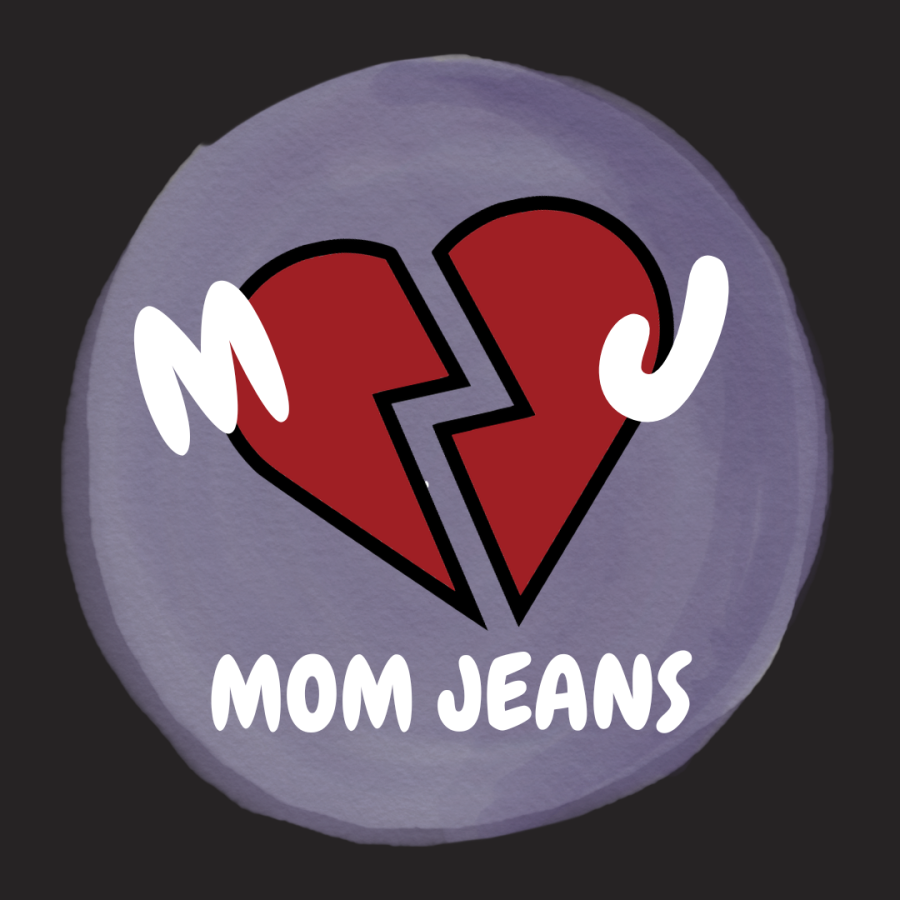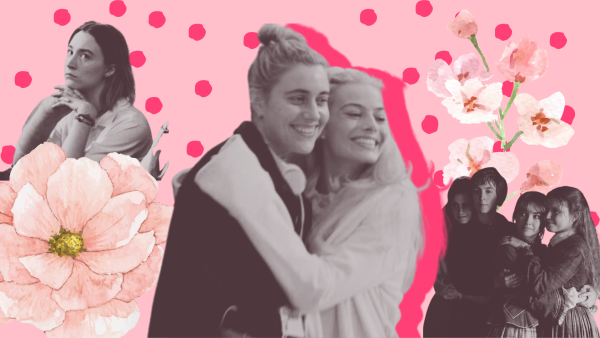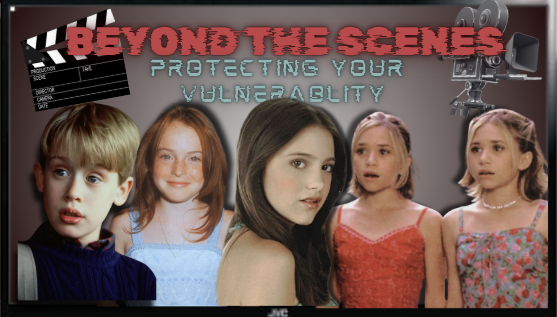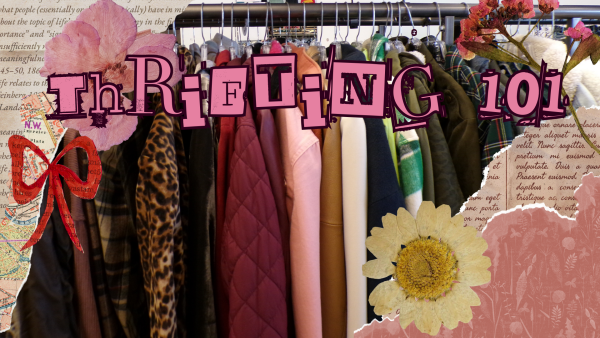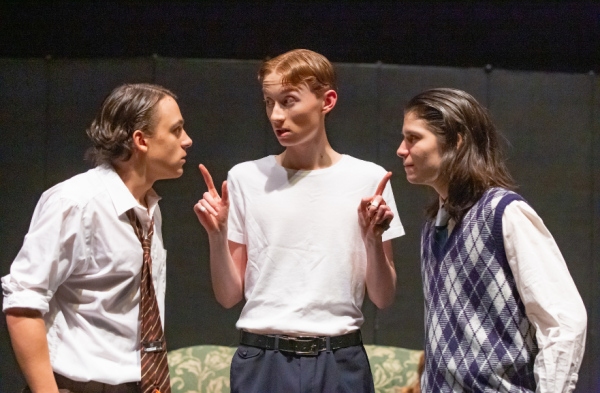Encapsulating HeartBreak: “Best Buds” by Mom Jeans
Content warning: mention of substance use and self-harm
The band Mom Jeans custom insignia (Photography by: August Berrios).
Band Background
There will always be a crowd of people who itch to listen to midwestern emo with a hint of indie pop. If you enjoy this type of music, Mom Jeans is the alternative rock/indie band. Founded outside of Berkeley, CA Mom Jeans is known for its midwest emo style music. There are four members in the band; Eric Butler (vocals, guitarist), Austin Carango (drums, trumpet), Bart Thompson (guitar), and Sam Kless (bass). Butler and Austin founded the band back in 2014 with Sam and Bart joining later on. Their first EP would only feature Austin and Butler with acoustic-style instruments. Two members, David McDowall and Josh Perline, aren’t currently in the band, although both left on good terms. Consequently, Mom Jeans would self-produce their first album, “Best Buds” on July 3rd 2016, which would skyrocket their career.
Album Background
Although a very popular album, it didn’t receive the best reviews from music critics. During an interview with Burn After Writing, Butler said, “I think that it’s pretty easy to look back and find faults in some of our earlier decisions with that album.”
Butler shows how touring so much and singing the songs on the album so many times, affected the way that they viewed the album. Butler says, “Either with the songs being too long or too short or with certain pieces of a song that maybe feel like they shouldn’t be where they are.”
Common Themes
The album is intent on showing every angle of losing a relationship. It shows what it’s like to suddenly lose someone, miss someone you can’t have anymore, the depression that can come with heartbreak, self-reflection about past relationships, and leaving behind an old relationship to find new happiness. Having all these different narratives in some ways displays the stages of getting over heartbreak and how it can be very challenging to move on. There is also a recurring mention of substance use throughout the album.
“Death Cup”
This song refers to the sudden and permanent end of a relationship. Moreover, this track encapsulates these feelings as the song progresses instead of handing the listener the main theme of the song in the beginning. This is achieved by changing the outlook of the relationship throughout the song. At the end of the track, the bridge seems to be completely burnt between the two characters mentioned in the song, showcasing the discrepancies of heartbreak.
The first verse is introduced with more of a retrospect, with the goal of making the listener feel as though they are listening to a one-sided conversation. This narrative is personified with the use of the word “you” being used 6 times. This repetition shows how these lyrics are being directed toward someone, but there is no response. The chorus, which is heard three separate times, directs how the singer’s character is reacting through this conversation. Butler says, “What do you want me to say when I can’t tell you the truth?”
The second verse continues the format of a one-sided conversation. This can also be inferred because the lyrics are aimed more toward the singer’s character and how he feels emotionally toward the relationship. The end of the second verse signifies the relationship status of the two characters at the time of this conversation. “You are my best friend and I don’t want this to end,” Butler says. The line shows how Butler can possibly see the relationship ending which throughout many songs is one of his biggest fears.
The final verse copies the second half of the second verse but the opinions of the singer’s character are a lot more negative. This is first seen at the beginning of the third verse Butler says, “It wasn’t worth it to me to wait around and then see all of my love go unspent.” Here the listener gets the answer to the question previously formulated. The lyrics evoke a solidified feeling of sadness and disappointment that the character feels toward the end of the relationship. At the very end of the song, the relationship between the two characters is finally settled Butler says. “You were my best friend, I didn’t want it to end,” Butler’s usage of past tense verbiage shows that the relationship between the two characters is permanently over.
“Danger Can’t”
The second song on the album, “Danger Can’t,” continues the theme of getting over heartbreak by displaying a narrative where Butler’s character is still in love with someone that he is no longer in a relationship with. This song also displays the self-awareness of Butler’s character, Butler still loves this person but not enough to go back to them. He knows going back would potentially harm his well-being even more. The beginning of the song starts with the self-realization from Butler’s perspective that he has not completely moved on from the person he lost. There is a mention of empty picture frames which exemplifies two concepts, it could relate to how the empty picture frames remind him of the relationship, or that it’s more of a metaphor for how he feels empty without them. The first verse ends with Butler’s character struggling to believe that it will get better anytime soon.
The second verse utilizes metaphors to depict how Butler still feels empty because of the way the person made him believe that this relationship would last. Butler says, “I’m getting tired of coughing out my lungs and sticking out my tongue to catch the breath you stole the day you told me this was love.” Of course, Butler is not trying to regain his actual breath, but rather he is trying to display how shocked he was when he heard he felt loved by his partner. The end of this verse continues to show his false sense of security in his relationship. Butler is more persuaded to believe love will last longer due to small displays of affection.
After this verse begins the second chorus, where the lyrics of the previous one are repeated. The lyrics in this section tie back to the whole meaning of the song where Butler still really loves this person but knows that he cannot get his hopes up because he will just be disappointed again. With this self-realization, Butler knows that some of the current actions of the person he still loves almost pull him back to them. The final lines of the piece in the chorus point out his flaws, continuing the narrative that he is reminiscing on past experiences. Butler says, “I loved you more than I ever loved myself.”
This is pivotal because Butler’s character doesn’t just realize the harmful patterns of his love interest but also what he did wrong. Butler not loving himself enough dampens his personal issues which affected his relationship without him realizing it.
The song’s outro then restates the mindset of his character moving on, Butler says “And it makes me kind of glad that you think about me late at night when you can’t sleep.” Although he was heartbroken, he finds the peace that they think of him at their lowest point. He decides not to interject because he believes that’s what’s best for him in the process of moving on. All of these ties in with the main narrative of the song where even though Butler still misses and loves someone, he knows that going back to the previous relationship would hurt him more.
“Movember”
Throughout the month of November, men will grow their facial hair to raise awareness of men’s mental health. This form of activism many men participate in is known as “Movember.” Butler uses this to describe how he feels about a failing relationship. This is also the first song that has a collaboration with another artist, Sarah Levy. The song begins with Butler believing that the person he is in love with does not care about him. He also accuses this character of not caring about the relationship.
In this first verse, Butler admits he has many thoughts he can’t share, but in exchange, the tone of the lyrics seems to be putting forth the notion that the person Butler loves doesn’t care to dig any deeper. Nearing the end of the verse, Butler shows his frustration at the numerous times his lover has lied to him regarding their relationship. He is frustrated at this because when he tries to dig in deep about his partner’s problems, consistent excuses stop him from being able to go any deeper. Butler says, “It’s just like back in the day when you were five the doctor said you would be fine but it still hurt and I’m still sure it was just a trick to make us feel alright.” The use of past tense develops a narrative where now the two lovers are older they lie about their feelings to make each other feel better.
The second verse only contains lyrics from Levy, this exclusion of Butler could entail that we now get to hear a rebuttal from his lover. Levy’s lyrics almost completely neglect the issues Butler is going through, instead offering a short-term solution. “Probably couldn’t hurt if we took a dip then I’ll finally be as clean as I felt back at eighteen.” Butler saying this helps prove his previous statement that the only fix to their couple’s issues can only be short-term.
The chorus after this verse includes both Butler and Levy. Although they sing in unison, the lyrics relate to Butler and how he’s scared his love interests will leave him. “If I were to grow a beard, stop drinking beer I fear you might not love me enough to make your stay.” Butler’s mention of growing a beard and stopping his drinking habits relates to the use of Movember, it also shows how he wants to become a better person even if he is in a failing relationship.
The bridge to the second chorus has Butler admit that his mental health is not the responsibility of his lover. “This problem can’t get fixed with three drunk texts and one wet kiss.” Butler is laying out that the toxic forms of affection that he receives don’t help with the problems Butler is going through. This ending restates Butler’s fear that he has not done enough to make his lover stay with him.
“Edward 40hands”
In the first verse, Butler is stuck on what to do towards the person he misses. He admits that even though things have changed, Butler’s feelings toward the person won’t be going away. He equates his feelings towards this person to the way cigarettes have a smell that sticks to clothing.
The second verse has Butler continuing to list the vulnerable feelings he still has for his lover. “I want you in my sleep and in my dreams, I wake up spooning my pillow, sweaty hands, but please don’t tell your friends,” he admits all of this but seems to have a self-plea that his interest does not tell their friends.
Verse three begins with Butler’s character alluding to his possible addiction to cigarettes. “At first I didn’t let myself inhale but smoke got through and so did you.” Butler referring to an addiction to cigarettes may be literal in the sense that he is using tobacco to cope. Still, it could also be a metaphor for his obsession with his ex-lover. His inhaling “smoke” refers to Butler becoming more vulnerable and now he is addicted to the thought of being with his previous partner. On the bridge to the first chorus, Butler can see that his obsession with his ex is unhealthy. Even though the cigarettes are killing him, supposedly his love interest is doing it faster.
In the chorus, Butler continues to express himself to his lover. He might be doing this because he believes that the more similar they are, the higher the chance that they will fall back in love. The recurring relation between the two characters is mostly attributed to negative attributes, like being addicted to cigarettes or being a liar. Butler’s justification to still be together is due to them having similar traits even if they are toxic.
The chorus that ends the song is just a shortened version of the last chorus. The difference is that there is an overlapping voice that sings the lyrics with him that accentuating almost a call for help with one final scream.
“*Sobs Quietly*”
The song “*Sobs Quietly*” starts with Butler apologizing to what seems to be his previous partner, the reason he is apologizing could be interpreted in two ways. The first reason could be that his plans with his then-partner didn’t work out due to things he is not in control of. On the other hand, Butler could be apologizing because his original intentions with the relationship ended up not working. Butler expresses, “We both know that planning’s not my strong suit,” and is admitting that his version of the future with this person never materialized but also displays that this person must have had prior knowledge knowing this isn’t his strong suit.
Butler still misses this person but at the same time, he knows he shouldn’t chase them. “I still don’t blame you for making me stall when I learned how to drive your car because all your best friends were all too sad to take you to the airport.” Here Butler mentions how pain didn’t just come from the separation but also the process of it. Continuing in this first verse Butler presents a dilemma, which at the time would be his partner. What can be extracted from this is that he and his lover have not lost feelings for each other but he doesn’t know if the relationship is worth preserving, Butler says, “Tell me why can’t you still make a decision?” This furthers the idea that the two partners may still have romantic feelings for each other but do not know if the distance between them will continue to separate them. The ending of the first verse includes Butler mentioning that he is better at crying quietly, which ties back into the title “*Sobs Quietly.*” The second and final verse of the track shows how Butler is fighting himself on what to do in the relationship. He restates that he still loves this person but he doesn’t know what is best for himself. It ends with Butler showing that he doesn’t want to choose how the relationship ends.
“Poor Boxer Shorts”
“Poor Boxer Shorts” by Mom Jeans, kicks off how Butler is going through a depressive cycle. He begins by trying to break the bad habits that come with poor mental health, but he seems to have no success. This verse ends with Butler expressing that he is fine but simultaneously indicates that he is not because he will not reveal his true feelings and thoughts.
The second verse has Butler stating the reason for his behavior, heartbreak. Butler says, “But that’s all right, I’ll be fine if this bleeding won’t subside ’cause it keeps me warm.” There are two ways this could be interpreted. It could either refer to the sense of heartbreak that is new to him, or it could refer to making himself bleed by self-harming. The implications of bleeding could also refer to physical harm.
The first bridge, which is brief, restates Butler’s trouble in doing simple day-to-day tasks due to his depression. The second bridge shows how Butler still wants to protect the person that broke his heart. “I’ll keep you safe as long as you let me,” says Butler. This could also refer to the skewed mindset after heartbreak. Moreover, this attitude could mean that the only thing that is in the way is a simple yes or no answer. The third and final bridge displays more of Butler’s desperation toward the person he loves. This love is unrequited which seems to bother him the most rather than the actions of this person. The song’s outro consists of Butler making a statement about one-sided love, “Cause I need you more than you need me.” This mindset reinforces his obsession with this person and how he doesn’t want to let go even though to the other person he is probably an afterthought.
“Remy’s Boyz”
“Remy’s Boyz”, adds a new narrative of heartbreak to the “Best Buds” album. The first verse has Butler speaking negatively about someone, which seems to be more unprovoked than in other tracks. Butler says, “I found no humor in your laughter, it stole my breath and took real effort to get out of my head and out my lungs,” which refers to the sense of complacency in a relationship. This stagnation within him could have been what caused the relationship to end negatively. Once again, the use of past tense vocabulary shows how he is looking back on memories rather than confronting them. At the end of the first verse, however, he admits that he still loves this person and this love is hurting him.
The second verse begins with Butler specifically referring to the past. “I’m looking back on all of these old notifications, But what do they say about me, what do they say about me now.” Butler is comparing himself to who he was earlier on in the relationship. “I’m sorry that I’m not exactly what you expected from me,” says Butler. This reveals that his actions were not directly negative toward the relationship, he just behaved how he usually would have and that’s not what his lover was expecting out of him. This could also be why he seems unapologetic throughout the song. He ends the song by displaying how the other person wants an apology but he doesn’t feel like he has anything to be sorry about.
“Girl Scout Cookies”
This track opens up with Butler understanding that he is not the one that his lover is interested in anymore, but he believes that this person can’t ignore all the things that they have told him. Presumably, he was being told things that related to their love for him, and other romantic conversations. Butler displays a theme that he doesn’t want to move on from his lover and that he can’t get with anyone else, Butler says, “I think back to all the times I kissed your hands and how I can’t stand the touch of any other hands.” Even though he longs to be loved again, his attachment keeps him in this repetitive cycle of finding love from someone who doesn’t want to give it.
These lyrics show how Butler is numb to love. Moreover, Butler reminiscing about the better times in the relationship seems to negatively impact his former lover, with the end of this first verse almost being a rebuttal to Butler’s ex-lover’s frustration. Butler seems to suggest that the words told to him by his ex had a larger impact than they had thought. “You tell me I should quit, well, I think you should sit right there and think about how your words make me feel.” This reveals that he felt unheard throughout the relationship, and how it should not be a surprise that painful emotions are occurring.
The second verse refers to how Butler would get high with his former partner. Butler also reveals that the song’s setting could be during a conversation, switching from his answers, to what his ex said, then to how he feels on the inside. Compared to the first verse, this could be seen as an eternal monologue because even though the conversation is negative, he will always enjoy spending time with the person he loves. The bridge to the outro displays a flawed and ironic solution to Butler’s issues. “So take me back I’ll wait,” the irony in Butler’s statement is how his issues involving his lover would be solved if he took initiative but he decides to just wait to be taken back. The longer he waits, the opportunity of having his lover back slips away. This flawed way of thinking shows how Butler doesn’t want to accept that his lover is gone and wants to sit and wait for them to come back.
“Scott Pilgrim vs. My GPA”
In “Scott Pilgrim vs. My GPA” Butler seems to be in the process of getting over heartbreak. “It’s hard for me to see exactly where the hell I went wrong, I never thought I’d see the day we wouldn’t get along…You think I smoke too much, I think your friends all suck,” Butler says. Using both of these lines shows how he has a contradicting mindset. He never thought it would end and then immediately lists things that they didn’t agree on. The use of the antithetical lyrics shows how most people can’t anticipate a romance is ending even if there are subtle hints. At the end of the first verse, Butler seems to be content with the way things are going. “But I’ve given up on luck but I’m happy here.” Butler refers to distancing himself from the mindset he had in the previous song. Before he wanted to wait and almost expected the love to come back, but now he realizes that’s not going to happen and he finally comes to terms with this harsh reality.
The second verse encapsulates Butler’s progress in getting over his lover. “So leave my sweater on the porch I’ll leave your bag under the stairs,” says Butler. He lays out the cycle of moving on from his previous partner and urges his former lover to do the same. “Don’t go back to our old place, it’s probably locked up anyway. I bet it still looks the same as when I ran away,” says Butler. He continues to suggest that he and his ex-partner avoid trying to relive the past. It also shows that he can recognize the old without being stuck in a cycle of missing what he used to have. This section of the song ends with Butler repeatedly saying, “I’m happy here.” This is important because now it doesn’t seem like Butler is trying to trick himself into believing that everything is okay. The song concludes with Butler repeating, “I sleep well alone now.” This could be a node to previous tracks on the album, where Butler mentions he frequently loses sleep over his lover.
“Vape Nation”
“Vape Nation” by Mom Jeans, shows Butler being more aggressive than before but he still seems to be over his lover. Although the song starts with Butler being scared of losing touch with this person, it also shows his mindset toward most people around him. “The reason why I try so hard to be nice is so no one else will leave me behind,” says Butler. The reason he misses his ex, even though he got over the person, is that he feels the need to treat everyone with endless love. However, this is the same love that caused his relationship to end. Regardless of his desperation throughout the first verse, he admits that he doesn’t want to be sad every time this person is around. This helps Butler in the sense he is still able to get over the emotions he had.
The second verse feels like Butler is trying to give the audience perspective and reasoning as to why and how he felt when he was treated throughout the relationship. Butler adds how he was so glad to be able to hold their hand, but doesn’t say how he misses it. Butler says “But you’re still so pretty and I’m still too skinny to hold all this weight on my own,” he shows how he thinks from an outsourced perspective they are still the same. but the caveat to this is that it may have always been apparent that Butler would never be able to hold all the mental baggage from the ending of the relationship.
The bridge to the outro shows what he has learned from being in love with this person. “But I find the time to tell everyone I love that someday, I won’t need them anymore, but that’s because they’ve given me everything I need to be me,” says Butler. What he is learning is that no matter how a relationship between someone concludes, in the end, it won’t be a big deal because they have provided Butler with everything he needed to be himself. He also connects this back to his relationship with this person by saying how his ex-lover let him be himself, and that’s what’s most important to him. The outro mentions sleep again and how even though he is okay with the way things went, he still finds everything exhausting except when he needs to sleep. Sleep symbolically often represents death, thus perhaps the death and final conclusion of Butler’s mourning for the previous lover.
Throughout the entirety of the album, the audience can understand and now see how the process of getting over a relationship has been difficult for Butler. But the reason why more common tropes of toxic relationships were being restated is that it marks the transition in relationships going from a kid to an adult. This is shown in multiple of the songs by using the past tense language that signifies how much change Butler’s character has experienced since he was in high school. The importance of this album also shows each angle of an ending relationship to make it more relatable to the listeners who might be more inclined to put themselves in Butler’s shoes.
Your donation will support the student journalists of Huntington Beach High School. Your contribution will allow us to cover our annual website hosting costs.
Thank you for supporting our program!


